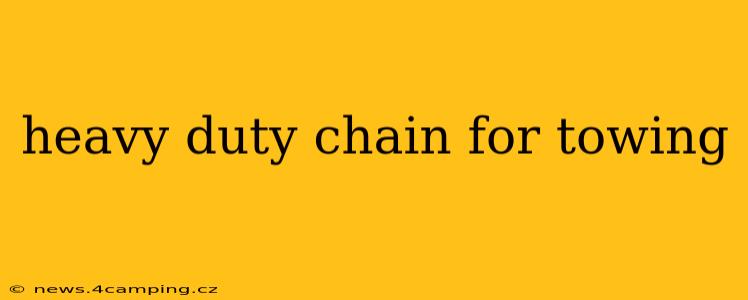Towing heavy loads requires robust equipment, and a heavy-duty chain is a crucial component for safety and reliability. Choosing the right chain is vital, as using an inadequate chain can lead to serious accidents and costly repairs. This guide delves into the critical aspects of selecting and using heavy-duty chains for towing, answering common questions and providing expert insights.
What Makes a Chain "Heavy Duty"?
The term "heavy-duty" isn't a standardized measurement. Instead, it refers to chains designed to withstand significantly higher tensile strength and breaking loads compared to standard chains. These chains are typically constructed from higher-grade steel alloys, forged to precise specifications, and often feature larger links and thicker diameters. Look for chains that clearly state their grade and working load limit (WLL). This WLL indicates the maximum safe load the chain can bear under normal use. Exceeding the WLL puts you and others at serious risk.
What Grade of Chain Do I Need for Towing?
Chain grade is a crucial factor determining its strength. Common grades include Grade 30, Grade 70, and Grade 100. Grade 70 is generally the minimum recommended for towing heavy equipment or vehicles, offering a substantial safety margin. Grade 100 chains are even stronger and suitable for exceptionally heavy loads and demanding conditions. Always verify the chain's grade and WLL before use.
How Do I Calculate the Right Size Chain for My Towing Needs?
Calculating the correct chain size involves considering several factors: the weight of the vehicle or object being towed, the anticipated terrain, and the type of towing equipment used. A safety factor of at least 5:1 is generally recommended. This means the chain's breaking strength should be at least five times the weight being towed. Consulting with a heavy-duty towing professional or referring to manufacturer guidelines is highly advised to ensure accurate calculations and selection.
What is the working load limit (WLL) of a chain?
The working load limit (WLL) is the maximum load a chain can safely handle under normal operating conditions. It's crucial never to exceed the WLL, as this dramatically increases the risk of chain failure. The WLL is typically stamped or marked on the chain itself.
What is the difference between a Grade 70 and Grade 100 chain?
Grade 70 and Grade 100 chains differ significantly in their tensile strength. Grade 100 chains are considerably stronger and are better suited for extremely heavy loads and demanding applications. Grade 70 is a reliable choice for many towing tasks, but if you're working with particularly heavy equipment or difficult terrain, a Grade 100 chain offers greater safety.
How long should my tow chain be?
The ideal tow chain length depends on the specific towing situation. Too short a chain can cause damage to the vehicles, while too long a chain can lead to excessive swinging and instability. Consult towing guidelines or a professional for recommendations tailored to your needs. Consider the articulation needed for maneuverability and safe towing.
How do I properly inspect a tow chain before using it?
Before each use, thoroughly inspect the chain for any signs of damage, including: stretched or kinked links, cracks, corrosion, wear, or any other abnormalities. If any damage is detected, replace the chain immediately. A damaged chain poses a significant safety risk and should never be used.
Maintaining Your Heavy Duty Tow Chain
Regular maintenance is vital to ensure the longevity and safety of your heavy-duty tow chain. This includes:
- Regular Inspection: Before and after each use, carefully inspect the chain for any signs of wear or damage.
- Lubrication: Periodically lubricate the chain with a suitable lubricant to reduce friction and wear.
- Proper Storage: Store the chain in a clean, dry place to prevent corrosion.
- Avoid Overloading: Never exceed the chain's WLL.
Using a heavy-duty chain correctly is paramount for safe and successful towing operations. Always prioritize safety and consult with professionals when in doubt. Remember to always check local regulations and guidelines regarding towing.
